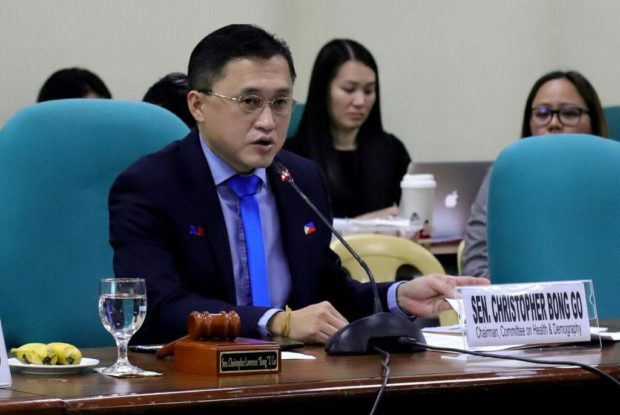Bong Go seeks to expand coverage of country’s immunization program
MANILA, Philippines — Senator Christopher Lawrence “Bong” Go, chairperson of the Senate Committee on Health and Demography, led the public hearing conducted jointly with the Social Justice, Welfare and Rural Development, and Finance Committees on Tuesday, September 24, where he enjoined the Department of Health to intensify its immunization campaign. He also encouraged parents to get their children vaccinated as he shared his proposed measure to expand the country’s immunization program.
“Our children are the most valuable resource we have, and yet they are also the most vulnerable citizens of this country,” Go said in his opening statement.
“We must, therefore, strive to protect the right of all children to survive and to grow,” Go stressed.
Noting that the country has been polio-free since October 2000 until its recent re-emergence, Go urged parents to trust the government’s immunization and vaccination programs, and have their kids immunized.
“Sa mga magulang, please, para po ito sa mga anak natin, ligtas po magpa-bakuna, libre po ito. Importante po na mabakuhanan ang ating mga anak para maproteksyunan sila mula sa mga sakit,” Go said.
Article continues after this advertisementThe senator added that “the outbreak demands for our urgent and collective action to protect children from being infected. This imposes the need to increase immunization coverage to stop infectious diseases transmission in the Philippines.”
Article continues after this advertisementIn July this year, Go filed Senate Bill (SB) No. 398 which seeks to expand the current coverage of the Mandatory Basic Immunization Program and “provides for the expansion of the coverage of the existing mandatory basic immunization program of the government under RA No. 10152.”
If passed into law, rotavirus, Japanese encephalitis, Pneumococcal Conjugate Vaccine (PCV), Human Papilloma Virus (HPV) and other types to be determined by the Health Secretary, upon the recommendation of the Formulary Executive Council and the National Immunization Committee, will be included in the coverage.
Currently, the program only covers tuberculosis, diphtheria, tetanus and pertussis, poliomyelitis, measles, mumps, rubella or German measles, hepatitis-B, and H. Influenza type B (HIB).
Seeking to complement the proposed expanded immunization coverage with intensive information dissemination, Go urged the Department of Health (DOH) “to intensify its immunization campaign, improve its health promotion and increase the confidence of parents towards vaccination.”
The senator also asked the DOH “to visit the most isolated and poor communities, and ensure efficient distribution of vaccines.”
According to Go, “children in poor communities who are deprived of so many basic needs are the most vulnerable and are in need of preventive care.”
Initiating the inquiries, Go sought updates from the representatives of the health department on the re-emergence of polio in the country.
“Kumusta naman po ang bata na nagkakaroon ng polio? Sino po ang tumitingin sa kanila? Totoo po bang may outbreak o wala?” Go asked.
DOH medical specialist Dr. Anthony Calibo responded, saying that “There has to be a number of cases detected for an outbreak to be defined. The two cases found make it an outbreak already because there were no reported cases in the previous years.”
To prevent the outbreak from getting worse, Go asked, “What should the parents do if symptoms surface? What is the ideal schedule? What measures are you implementing for this case?”
Calibo explained that the “recommended schedule for oral polio vaccine starts as early as 6 weeks old or 1 1/2 months. Meanwhile, booster vaccination may happen between 1 year and 1 year & 6 months.”
During the questioning, Go also noted the reported under-distribution of vaccines by a Commission on Audit (COA) report.
“In a 2017 report, COA flagged under-distribution of vaccines. What is the status? Meron pa rin bang hindi nadi-distribute na bakuna? Ano ang dahilan sa mabagal na distribution?” the senator asked.
The DOH responded, saying that they have already acted on the issue and have improved their communication with their regional counterparts to ensure that the vaccines reach timely the facilities that require them.
Eastern Samar governor Ben Evardone also lamented during the hearing the lack of health facilities and health personnel in the provinces. Go echoed his sentiments, saying that he has already talked with DOH Secretary Francisco Duque III to fund enhancement of health facilities using the Health Facilities Enhancement Program (HFEP).
“Galing po ako sa hospital sa Borongan. Nakita ko ‘yung sitwasyon ng pasilidad at maraming pasyente. Sinabi ko kay Sec. Duque na gamitin ang HFEP na pondo para mapaayos ‘yun. Hindi ko maintindihan bakit may underspending samantalang napakaraming mga pasyente, nasa corridor, nakahilera. Iyan ang hindi ko maintindihan,” said Go.
Meanwhile, Dr. Salvacion Gatchalian, president of the Philippine Pediatric Society, said that they support Go’s proposed SB 398 which seeks to expand the coverage of the country’s immunization program.
“The Philippine Pediatric Society, together with the Pediatric Infectious Disease Society of the Philippines, supports the proposed inclusions in the bill,” Gatchalian said. “But we also suggest a national immunization technical advisory group which is an independent body from the DOH.”
Gatchalian said that they also support the DOH’s call for additional resources.
Moving forward, the senator urged the health department and all Filipinos to do their part in combatting the country’s health concerns.
“The DOH should do its part – inform and vaccinate, the parents should also play their role – libre po magpabakuna, pabakunahan po natin ang ating mga anak,” Go said.
“Together, we should strive to give each and every child an equal opportunity to survive,” the senator added.
